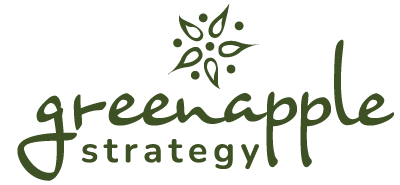There’s more than one way to bake a cake, but every great cake requires certain ingredients.
Just like there’s more than one way to bake a cake, there’s no singular approach to marketing planning. Think of it this way: every great cake requires certain ingredients. Similarly, every successful marketing campaign requires a strategic foundation.
At Green Apple, we make sure all the key ingredients are in place through our strategic planning services. While we typically collaborate with our clients to create comprehensive annual marketing plans, we also recognize the need for short-term campaigns for specific initiatives that propel your business forward.
When To Employ Ad-Hoc Marketing
Ad-hoc marketing planning is a more agile and adaptable approach to marketing planning that is typically used by smaller marketing teams. It involves identifying and addressing marketing needs as they arise rather than developing a comprehensive annual marketing plan in advance. This approach is often necessary for smaller businesses with limited resources or those that operate in rapidly changing markets.
Here are some instances when a responsive marketing approach is more suitable than a comprehensive annual marketing plan:
- Dealing with limited time or resources. Small and mid-size businesses often need to focus on what’s in front of them, so long-term planning can be difficult to implement.
- Launching a new product or service. When introducing a new product, service, or initiative, an ad-hoc approach allows you to focus on a targeted and short-term campaign to create buzz, generate interest, and gather initial feedback.
- Entering a new market. When businesses enter a new market, they may not have the resources or time to develop a comprehensive annual marketing plan.
- Facing new competitive challenges. If your business faces strong competition or emerging rivals, a responsive strategy allows you to swiftly counter competitive threats and seize opportunities as they arise.
- Managing budget constraints. If your marketing budget is limited or uncertain, you can allocate resources more effectively by concentrating on high-impact, short-term initiatives.
In these scenarios, a responsive marketing approach provides the agility and adaptability required to navigate changing circumstances and capitalize on opportunities.
Best Practices for Ad-Hoc Marketing Planning
How can you ensure your ad-hoc planning aligns with your overall business objectives to prevent slipping into a more reactive approach to marketing? Here are a few best practices to consider:
Keep Your Eye on the Big Picture: Ensure Alignment with Your Overall Strategy
Ad-hoc marketing should align with your overarching brand narrative strategy. Before diving into the specifics of your responsive marketing plan, take a step back and clearly define how it connects with what you’re hoping to achieve overall. What specific campaign, initiative, or opportunity are you addressing? What do you hope to accomplish with this plan?
It’s also important to note that the absence of a comprehensive annual plan should not equate to a lack of strategic direction. Even if you don’t have an overarching marketing strategy, ensuring that your marketing activities align with your overall goals is important.
Know Your North Star: Set Clear Objectives to Guide Your Efforts
It’s essential to take a similar approach to ad-hoc planning as you do to annual planning. You’ll still need to set measurable marketing goals and a timeline of when you plan to reach them. Define specific and measurable goals for each opportunity or need. Doing this will allow you to evaluate success and impact more effectively.
Prioritize Your Power Plays: Focus on Opportunities with the Highest ROI
When your budget or time is limited, you want to focus on opportunities that have the potential to make the most significant impact on your business. This could include opportunities with high ROI, a strong alignment with your target audience, or those that address critical business needs.
Walk in Your Customers’ Shoes: Understand Their Needs and Desires
Put your customers at the center of your marketing strategy and focus on meeting their needs. What are their pain points? What are their goals? What are they looking for from a business like yours? By understanding their needs, you can develop more effective marketing campaigns.
Become a Data-Driven Marketer: Leverage Insights to Optimize Your Campaigns
Refrain from relying on intuition or guesswork when developing your marketing plan. How will you track progress and measure the impact of your marketing efforts? By defining metrics upfront, you can make informed decisions and refine your plan. This will also help you to make more informed marketing decisions in the future.
Embrace the Experiment: Test, Learn, and Refine Your Approach
When implementing ad-hoc marketing plans, consider embracing the idea of the marketing sandbox. A sandbox approach means that you launch new ideas with smaller resource allocations while watching analytics carefully. This approach allows you to gather valuable data and insights without overcommitting resources.
If initial results are promising, you can gradually allot more resources and refine your strategies based on the data from each test. This iterative approach will help you optimize your marketing efforts and maximize the impact of your ad-hoc campaigns.
Tap into External Knowledge: Collaborate with an Agency to Unlock Your Full Potential
If you find yourself stuck in a reactive approach, consider outsourcing your marketing planning or implementation to an agency. One of the most significant benefits of hiring a marketing agency is that they offer access to a broader pool of expertise, fresh perspectives, and specialized tools that may not be readily available within your organization.
When finding the right marketing agency, you want to find a partner who can help you take a more proactive approach rather than simply offering services that meet your immediate requests.
Empower Your Marketing with a Proactive Approach
Navigating the changing landscape of marketing requires agility and adaptability. By embracing a strategic approach to ad-hoc marketing, you can respond effectively to new opportunities and challenges while staying true to your overall business goals.
If you’re looking for guidance and support, our team at Green Apple Strategy can help. We specialize in developing customized marketing strategies that align with your overall business plan.
Schedule an exploratory consultation today, and let us share how we can help you achieve your marketing goals.


